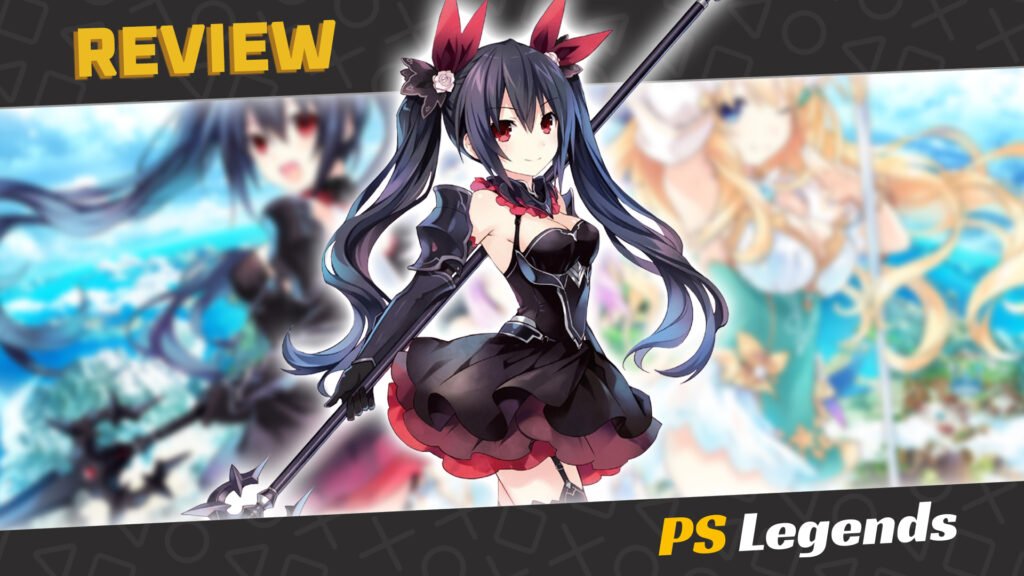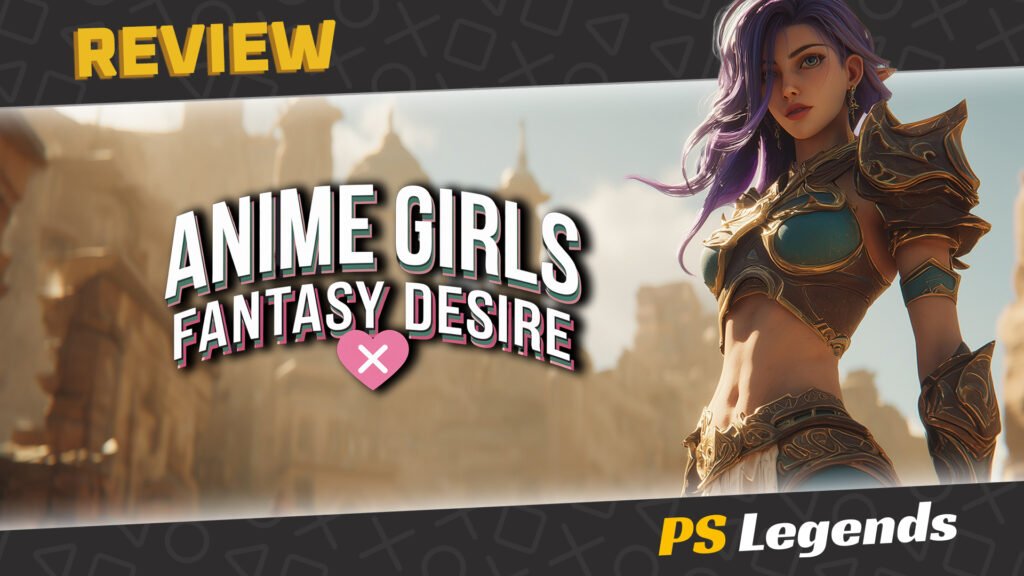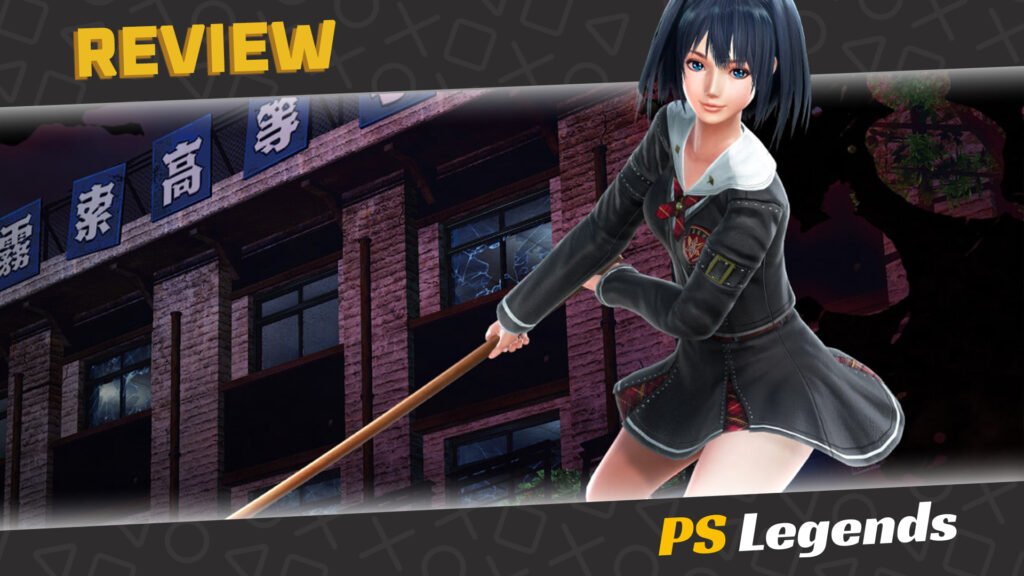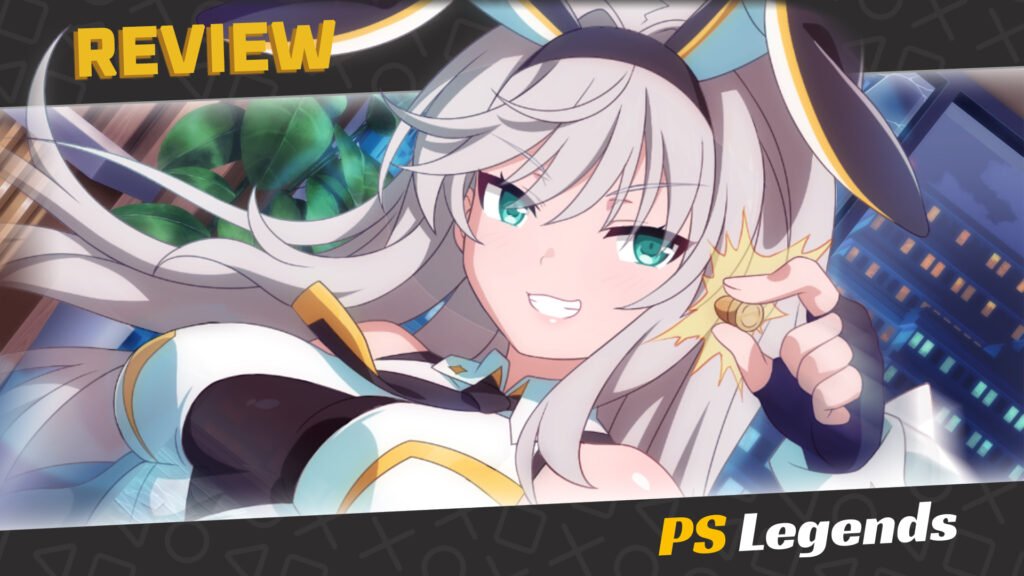I’m sorry to see the Tamsoft Neptunia spin-off games don’t get the same praise as the mainline entries set in the Hyperdimension universe. Previously released exclusively on the Vita, Hyperdimension Neptunia U: Action Unleashed and Megatagmension Blanc + Neptune Vs Zombies both made for fun action-adventure JRPGs albeit with shorter stories and shorter runtimes from what we’re used to.
Cyberdimension Neptunia: 4 Goddesses Online is the third installment in this sub-series of games, this time jumping over to PS4 and incorporating more advanced mechanics and a story which exists within the established Hyperdimension timeline.

Introduction
Cyberdimension Neptunia: 4 Goddesses Online is a Japanese action-RPG. Despite the title, the game is a single-player game with an optional online cooperative multiplayer option. This is the first Neptunia game to use Unreal Engine 4, as well as the first spin-off game to be released on the PlayStation 4 rather than the PlayStation Vita. Cyberdimension Neptunia marks Tamsoft’s third Neptunia spin-off overall.
Unlike the previous Tamsoft-made action games for the series, only the four CPUs: Neptune, Noire, Blanc and Vert, and their sisters: Nepgear, Uni, Ram and Rom, are the only ones playable, along with the four Divine Goddesses in the later parts of the story who resemble and replace the CPU’s usual transformed appearances. The game’s story and setting are similar to many ‘MMO-trapped’ franchises like .hack// and Sword Art Online.

Story
Though technically a spin-off, Cyberdimension Neptunia is also a canonical instalment in the Hyperdimension saga, picking up shortly after the events of Megadimension Neptunia VII. Peacetime has returned to the world of Gamindustri, a world that exists in a dimension separate from our own, where the four CPU goddesses protect and rule over their respective nations.
The goddesses Neptune, Noire, Blanc, and Vert, along with their respective sisters, the CPU candidates, have saved the world from danger countless times after putting aside their past rivalries to become close friends. Now, the girls are enjoying the benefits of their revived celebrity status and are selected to be beta testers for the newest version of Vert’s favourite online game, ‘4 Goddesses Online’.
The four CPUs were able to receive an early-access code for the newest instalment of the popular online game, which uses the real forms of the CPUs as official models for the game’s AI Goddess characters. Each CPU logs into the game, led by regular protagonist Neptune, and the gaming-addicted mentor-like, Vert.
Upon entering the game, they are approached by the guardian spirit, Bouquet, who is one of the game’s non-playable characters who is equipped with the game’s super advanced artificial intelligence. They are told that they are the ‘Chosen Ones’ who are tasked to save the fantasy land of Alsgard from the Demon King Jester by awakening the four Divine Goddesses of legend. The girls endeavour to finish the game before anyone else, defeating the Demon King and freeing their AI counterparts.
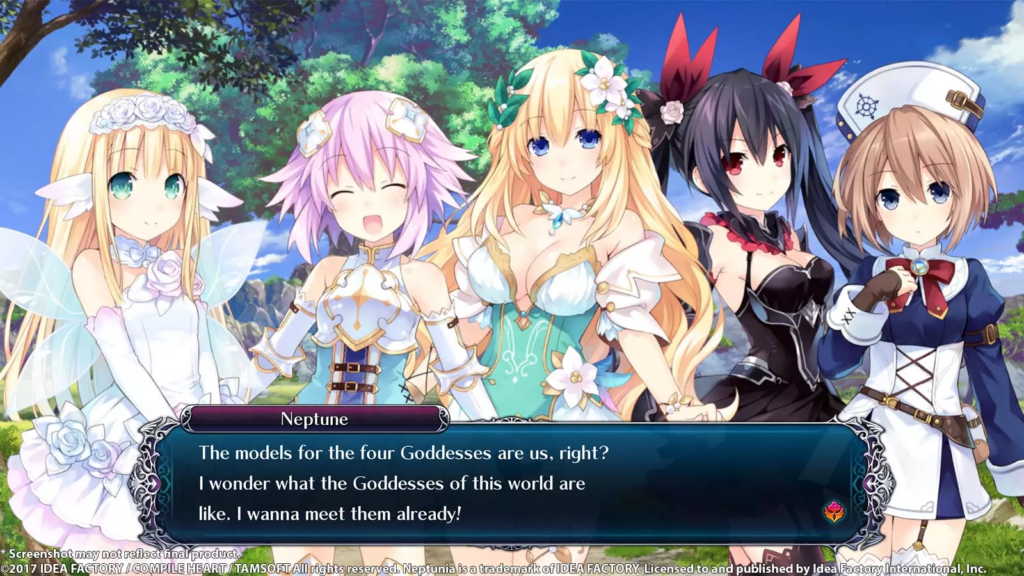
Gameplay
Cyberdimension Neptunia: 4 Goddesses Online is an action-RPG where the world within 4 Goddesses Online, Alsgard, can be explored by Neptune and her friends. To progress the game, the player must take Quests at the Guild Facility in the Adventurer’s hub, Wishuel. They will be required to complete a number of objectives in various dungeons to clear the quest in order to progress the story.
The player controls one character in a party of up to four. Three players can be controlled by friends if the player is playing online. Otherwise, an AI will take control of the other three characters. When the player launches an attack on monsters within the dungeons, a battle will seamlessly begin. Aggressive enemies will attack when you get too close, so if you’re in a pinch, you can avoid some fights by distancing yourself from the enemy. The characters that participate in battle gain experience points, bells (money) and useful items upon victory.
The player will be fighting enemies with normal attacks and skills. The player can launch a series of normal attacks, on the ground or in the air by pressing the relevant button. By attacking enemies with normal, your SP will restore by 1 per hit, and the Awakening Gauge will rise. Attacking with aerial attacks that are melee will restore the SP by 3. By using SP, you can use powerful special attacks. You will learn new skills by increasing your Level. You can assign a skill to the face buttons. There are two Skill Sheets available to assign skills to, and you can switch between them during battle. Physical Skills are good for lowering HP, and Magic Skills more easily lower the enemy’s Break Gauge.
By locking on with the R1 button, the enemy’s status will be displayed in the screen’s upper left. The player can view their HP Gauge, their weaknesses, and their Break Gauge. By reducing the Break Gauge to 0, the enemy will be immobilized for a short time where they will take additional damage. When fighting bosses, this is especially important to prevent a drawn-out fight where bosses may have the opportunity to use more devastating attacks on the player. There are four types of elements: Fire, Ice, Lightning, and Wind. Attacking using elements displaying the ‘Weak’ alert is also effective.
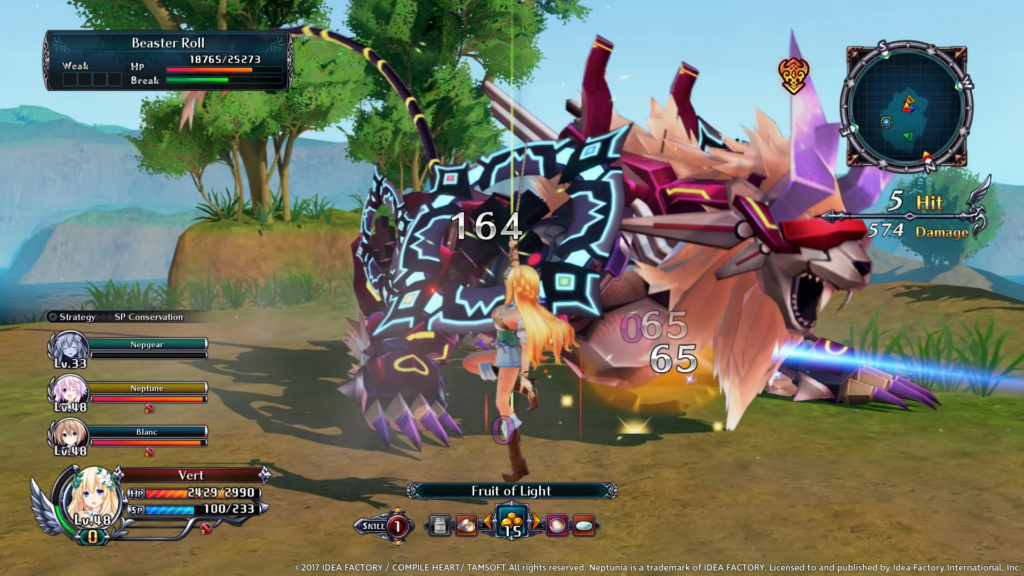
By holding down the R2 button, the player character will guard and take reduced damage from attacks. By getting the timing right, the player character will launch a counterattack at the enemy. Physically oriented characters will close the distance on the enemy during their attack while ranged-oriented characters will launch a projectile at the enemy. Landing a successful counterattack will recover a character’s SP. By using the L2 button, the player character can quickly dash forward, closing the gap on the enemy. Using the normal attack while stepping forward allows the player to ‘dash-attack’.
With ‘Tactics’, you can decide what strategy to instruct to your party members with. You can choose from nine types of tactics and your AI party members change their behaviour according to the Tactics specified. In Wishuel, the hub for adventurers, there are Facilities which assist the player in adventuring. There are numerous shops, a Cathedral, a blacksmith, training grounds, a guild, a bulletin board, and a minstrel. Facilities are unlocked as the player progresses the game.
The player can accept various quests depending on your Guild Rank, and by clearing certain quests, your Guild Rank will increase. The player is rewarded with bells and items for completing quests. Quests are location-specific. By completing Certification Quests, the player’s Guild Rank will increase. Certification Quests are important quests that raise your Guild Rank. They will appear depending on story progression and quest completion.
The player can play with others using Room Creation and Search and can take on Multiplayer Quests with a maximum of 4 people. The types of Quests you can choose from will increase when your Guild Rank increases throughout the game. As usual, this facility requires PlayStation Plus Membership and a working internet connection to function.
The player can send messages to other players through the Chat Menu. Via Chat, there is Normal Chat which sends fixed messages, and EX Chat which sends lines from the character being controlled along with voice clips. The player can also freely enter any text and send it. By pressing the touch pad button, the player can open the Chat Screen without having to open the Menu. Normal chat allows you to edit and register the fixed sentences freely. It’s convenient to register frequently used phrases.
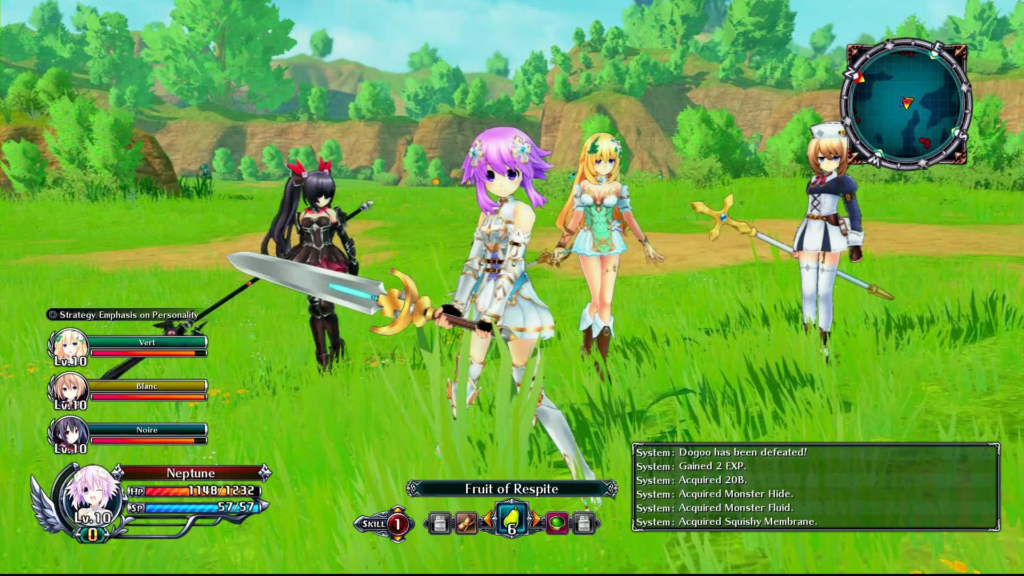
Graphics/Sound
The visuals actually seem like a bit of step back in some respects. The usual vibrant colour palette is still there and the frame-rate is pretty consistent throughout, while the character models are a little hit-and-miss when compared to Megadimension Neptunia VII.
As the characters you see are technically avatars of characters, they’ve been given an odd texture reduction. The light and shade quality is downgraded and there’s a strange black outline around everyone. I understand that these avatars should theoretically be less realistic than their counterparts, but I’m not sure such a change is necessary in an anime game.
It is also the first game that Erin Fitzgerald is not reprising her role as Noire in the English dub, due to the complications with her Screen Actors’ Guild contract, and is replaced by a solid (yet softer) performance from Erica Mendez. Mendez has replaced her role in this and all future games.
Melissa Fahn (Neptune), Wendee Lee (Blanc), Christine Marie Cabanos (Nepgear), Kate Higgins (IF), and Cristina Vee (Compa) are reunited with Erica Lindbeck (Uzume), Cherami Leigh (Plutia) and Sandy Fox (Peashy) to give us a five-star voice-actress extravaganza which puts all other aspects of the sound to shame. It’s a hell of a cast.
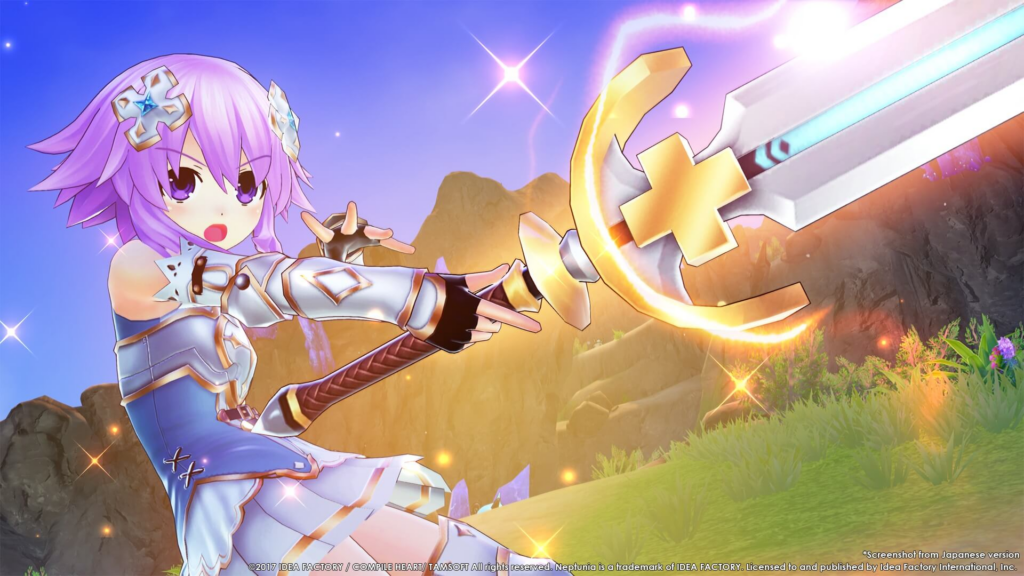
Replayability/Trophies
The trophies are the most generous collection attainable in a Neptunia game to date, and simply consist of finishing the game, levelling up your party and finishing all quests which can be done in as little as 20-25 hours, where normally you’d have to make multiple playthroughs to see alternative endings and max out character relationships. 4 Goddesses Online feels like a godsend of a trophy list, and a well-received platinum which can be done entirely offline too.
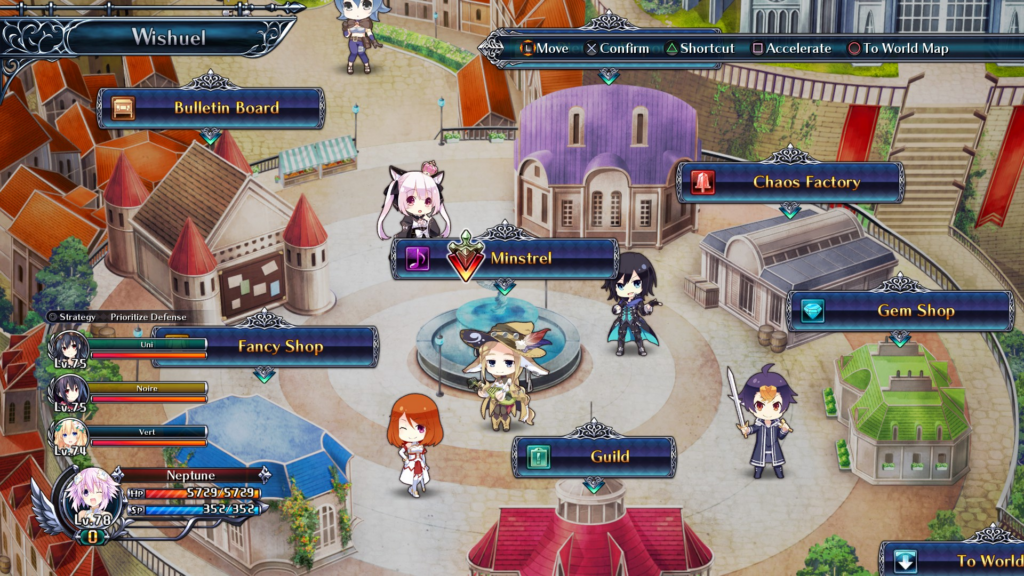
Conclusion
It’s easy to be hard on Cyberdimension Neptunia since it doesn’t offer much of relevance as a canonical sequel. What little plot we have here is incredibly thinly spread, while most of the subplot consists of Vert trying to adopt the adorable AI Bouquet as a proxy younger sister, since unlike her comrades, she has no siblings of her own.
It’s nice to see Vert taking on a more protagonist-like role, since both Noire and Blanc got to take centre-stage in their own respective games. Maybe don’t expect much of a character arc here though since there isn’t much of a narrative to contribute to.
Cyberdimension Neptunia is something else; It’s part sequel, part spin-off, and all reunion. Think of this as a big, light-hearted get-together for all the characters we’ve come to meet over the years. Even game-specific guest characters including Uzume, Plutia, Peashy and Tamsoft all get a bit of screen-time as supportive NPC roles.
There is also a layer of character development present for the main playable characters, since each is represented as a high-fantasy avatar of themselves, while the four Divine Goddesses arguably represent the most holy, diligent and powerful forms of the CPUs; a version of themselves they could potentially be if they weren’t quite so easily distracted, though we wouldn’t have them any other way.
It’s interesting see each girl’s chosen character-class to see how they view themselves in a more high-fantasy setting. Neptune is a Paladin, Noire is a Black Knight, Blanc is a Priest, Vert is an Enchanter, Nepgear is a Mage, Uni is a Thief, Rom is a Samurai and Ram uses the Ninja class.
As always, there is depth here, yet very little plot to actually analyse. It makes for a fun adventure while it lasts, yet it’s also entirely forgettable when you’re done. A charming reunion with all our favourite characters, but not much more than that.
Joys
- A fun reunion including iconic returning guest characters
- A Neptunia action game finally on PS4
- A solid effort with the voice acting, even without Erin Fitzgerald
Cons
- Very little story
- A visual downgrade
- Not quite enough character development to stand out
